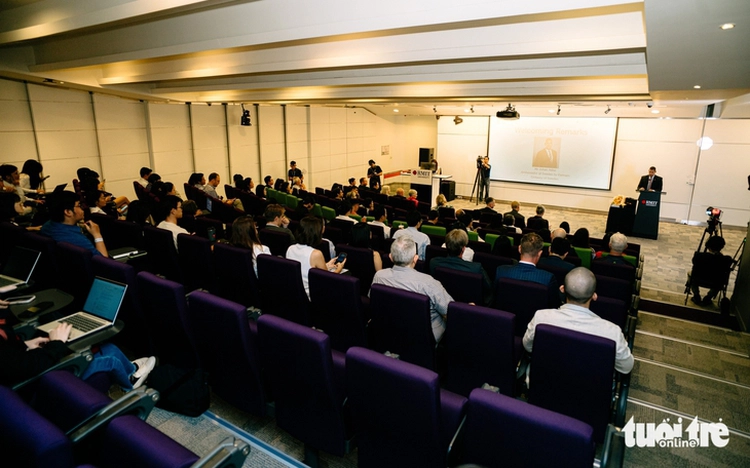
An overview of the Nobel Prize Exhibition and Dialogue 2025, co-hosted by the Swedish Embassy in Vietnam and RMIT University Vietnam in Ho Chi Minh City, September 15, 2025
Held under the theme 'The Role of AI in the Future of Learning and Teaching,' the Nobel Prize Exhibition and Dialogue 2025 was intended to bring the Nobel closer to Vietnam’s academic community while reinforcing the Vietnam–Sweden strategic partnership in science, technology, and innovation.
The event brought together Swedish scholars, including Professor Ulf Danielsson, a member of the Nobel Committee for Physics, along with lecturers, researchers, and students from across Vietnam.
It featured two main parts: an exhibition highlighting more than a century of Nobel achievements and a dialogue with leading Swedish scientists.
Guest speakers, including academics and representatives from technology companies, shared insights on the role of AI in shaping the future of learning and teaching in Vietnam and globally.
Speaking to Tuoi Tre (Youth) newspaper, Swedish Ambassador to Vietnam Johan Ndisi described the Nobel Prize as a symbol of human achievement and global cooperation.
“Every year when the Nobel Prize ceremony takes place, the world’s attention turns to Stockholm. As a child, I was fascinated watching those moments on TV,” he recalled.
The ambassador said the exhibition highlighted Vietnam’s strong interest in science and voiced hope that a Vietnamese scientist would one day win a Nobel Prize.
He noted that the committee considers nominations from around the world, assessing individuals whose innovations have benefited humanity.
“Everyone has a chance. Anyone, from any country, can win a Nobel Prize. It is an open platform for all,” he stressed, adding that the prize belongs to humanity as a whole.
He also emphasized that the strategic partnership between Sweden and Vietnam, established in June, provides a strong foundation for the two countries to advance academic cooperation.
A highlight of the event was a talk by Prof. Danielsson on the Nobel selection process.
Speaking about the Nobel Prize in Physics, he noted that there is no universal formula for winning.
Beyond effort and discipline, laureates often share qualities such as passion, courage, and a radically new way of thinking.
The Nobel Prize, he said, is not merely a reward for achievement but a recognition of the audacity to imagine the world differently.
Established in 1901 by Swedish scientist and inventor Alfred Nobel, the prestigious Nobel Prize is awarded annually to honor individuals and organizations with outstanding contributions to humanity in six categories: Physics, Chemistry, Physiology or Medicine, Literature, Peace, and Economics.


Max: 1500 characters
There are no comments yet. Be the first to comment.